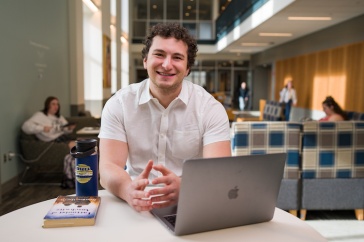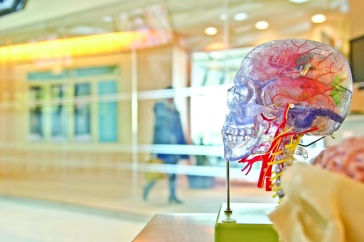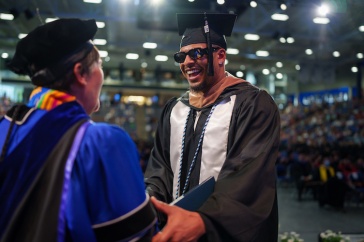
When she received her UNH diploma on May 19, 2016, Becky Baker became the first graduate of UNH Manchester’s Biotechnology program. Within a week, she accepted the position of Laboratory Scientist Trainee in the Virology/STD section of the Public Health Laboratories in Concord, N.H.
Baker is now a Laboratory Scientist II at the Public Health Labs, which operates under the New Hampshire Department of Health and Human Services to protect public health in the state through laboratory testing for critical incidents, food safety, infectious disease control and more.
Baker had always envisioned a career in a laboratory. An alumna of Nashua High School, Baker came to UNH with the intention of studying chemistry. She liked the proximity and community of the Manchester campus, but knew the program she wanted was in Durham.
“I chose Manchester because of the smaller community, and because I had been out of school for seven years,” Baker said. “But I actually transferred to Durham for a semester because I thought chemistry was where I wanted to go.”
Baker quickly discovered that she did not have chemistry with the major. She found she didn’t enjoy the subject as much as she expected to and didn’t feel like she could thrive academically without passion. She decided to switch gears: In 2013, Baker returned to Manchester to study biology, a path that would still allow her to work in a lab.
While she enjoyed the lab elements of the biological sciences major, Baker didn’t see herself working in healthcare, a focus of the program. She was thrilled when a new major in biotechnology was announced in 2015.
“A lot of biology is healthcare-related, which isn’t where I saw myself going,” Baker said. "Luckily for me, Dr. MacLea came and started biotechnology, and it was kind of meant to be.”
Kyle MacLea, assistant professor of biological sciences, said the biotechnology program was designed to give students like Baker the skills they need for careers in the lab.
“Students learn cell culture, techniques for studying nucleic acids and proteins, genomics and more — everything that’s in common use in real-world labs,” MacLea said.
Baker said these skills helped her through internships at Manchester Water Works and Elliot Hospital, which she completed in the spring before graduation. At Manchester Water Works, Baker ran chemical and microbial tests on samples from around the city. She said the hands-on work was extremely beneficial.
“I have also had hands-on experience with the autoclave and making growth media for their bacterial testing,” Baker said. “It has expanded my knowledge of lab techniques greatly.”
At the Elliot, Baker completed an extensive job shadow of the Manchester and Londonderry labs. She learned the instruments used and tests run in each section of the medical lab, including histology, microbiology, urinalysis, blood bank and more.
“I think they enjoy teaching me as much as I enjoy learning,” Baker said. “It’s a great experience to see what parts of the lab I would like, and which parts I wouldn’t enjoy as much.”
Baker said the experiences she had through the biotechnology program and her internships have been invaluable. Her advice to other students is simple: Utilize your campus resources and seize real-world opportunities.
“Don’t be afraid to ask questions, because the professors want to help you succeed,” Baker said. “You never know what you will be doing when you go out in the real world, so try and learn everything you can.”
-
Written By:
Kassidy Taylor | Marketing & Communications, UNH Manchester | kassidy.taylor@unh.edu



















































